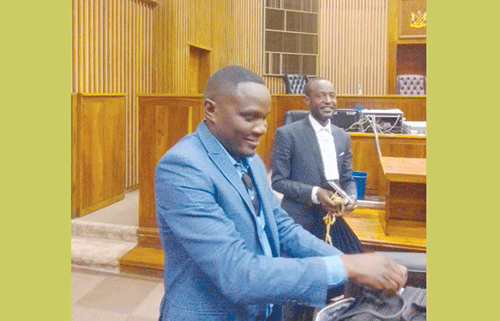Windhoek High Court Judge Naomi Shivute last week declared the bank records of Sakaria Megameno Namwandi, obtained by the Bank of Namibia (BoN) and Namibian Police Force, admissible as evidence during the fraud trial.
Namwandi allegedly operated a Ponzi scheme, and is accused of defrauding 79 persons to the tune of N$4.3 million during 2019.
He cried foul about financial records the State wanted to introduce as evidence.
His Legal Aid-instructed lawyer Joseph Andreas claimed that the records were obtained by the prosecution using incorrect procedures.
This resulted in a trial-within-a-trial to establish the validity of the records.
In her ruling, admitting the records as evidence, Judge Shivute found that although the Constitution protects unwarranted interference with the right to privacy, this right is not absolute. She said there are limits to it, as it is done in accordance with the law and as necessary in a democratic society for the prevention of crimes as well as protection of the rights and freedoms of others.
The judge found that Namwandi’s right to privacy was not infringed because section 64(10) of the Banking Institutions Act provides for the disclosure of bank records, books, registers and correspondence for the purpose of instituting or during any criminal proceedings, provided that such disclosure must be limited to the affairs or accounts of the customers who are under suspicion.
Shivute added that it was not necessary for the BoN to obtain search warrants for the purpose of examining the transactions reported to it by Bank Windhoek and FNB.
“The BoN had a statutory duty to analyse and assess whether the accused persons were violating any provisions of the Banking Act,” the judge stated.
She added: “Again, financial institutions have a duty to report all suspicious transactions”.
Judge Shivute said if the principle of without prejudice is brought to criminal matters, it would have the effect of violating public policy.
In addition, it will not be in the interest of justice, as it would have the effect of enabling otherwise guilty persons to evade justice and prejudice the victims of the conduct.
“In the interest of public policy and interest of justice, it is justifiable for documents marked ‘without prejudice’ to be admitted in evidence, as they are not protected by the principle ‘without prejudice,” the judge stressed.
She said although the police and BoN used the wrong procedure to search and seize the impugned documents, it does not render the documents obtained as inadmissible evidence.
Shivute added that fairness dictates that documents obtained, albeit unconstitutionally, must be admitted. “Where real evidence was discovered consequent upon an irregular search, it would be justified for such documents to be admitted in the interest of justice, and to protect society and prevent crime,” she said before declaring the documents as admissible. Namwandi and his entity are facing 123 charges of fraud, alternatively theft by false pretences; one count of money-laundering; one count of racketeering; one count of conducting banking business while not authorised; and one count of conducting a Ponzi scheme.
In addition, he is charged with two counts of tax evasion and two counts of failure to pay tax.
Namwandi denied all the charges. It is alleged that he was the sole member of Asset Legacy Investment CC. He had the duty to conduct legitimate business on behalf of the entity, and facilitate the reception of legitimate business funds held at various banks.
The State claims that he formulated and operated a Ponzi scheme in which he, through the entity, advertised two types of investment facilities to members of the public. This was done through face-to-face interactions as well as social media platforms.
The activities were conducted under the guise that the invested funds would be traded on foreign exchange platforms with a return of 50% within 30 days.


